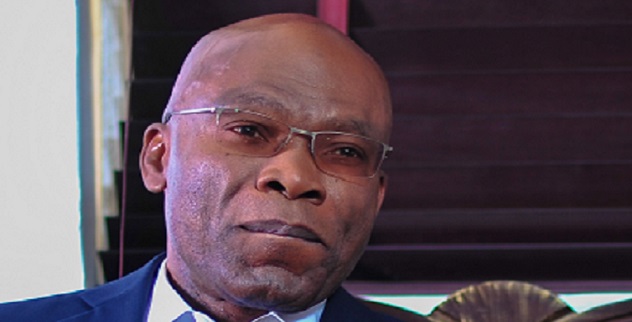News
Blackmail, Not Forex, Major Reason for Multinationals Exiting Nigeria – Ekeh

Leo Stan Ekeh, Serial digital entrepreneur has spotlighted the chief reasons why multinationals are exiting Nigeria and warned that if nothing was done, more of such businesses and indigenous ones may close shop in the coming months and years.

Leo Stan Ekeh
In a press statement, Ekeh who is the Chairman of Zinox Technologies Limited, a Nigerian conglomerate with international affiliations, urged President Bola Tinubu to address the critical issues of corporate blackmail and bullying, which he said frustrate the Federal Government’s effort at promoting ease-of-doing-business in the country.
While acknowledging that scarcity of forex is a challenge for businesses operating in Nigeria, he said these challenge can be surmounted especially with the new push by the Tinubu government to inject more forex into the system.
He stated that the depreciation of the naira, which dropped from N422.00/$ in June 2023 to N951.94/$ in December 2023 at the official window, following the floating of the naira by Central Bank of Nigeria (CBN) is only a convenient reason cited by the exiting multinationals.
“On face value, some of the exiting multinationals cite difficulty in procuring forex as reason for closing shop in Nigeria, but they are only being diplomatic. Many of them have had to contend with all manner of blackmail and corporate bullying from professional blackmailers aided by our slow judicial process.
“This has become an emerging but very destructive business model in our country, and unfortunately, the legal system is handicapped to protect the victims because of the long years it takes to discharge a case,” he said.
According to Ekeh, the escalation of corporate blackmail over the years is responsible for the low attraction of foreign direct investments (FDI) relative to the size of Nigeria’s market and potential.
Referencing an open letter he addressed to President Tinubu, Ekeh cited an issue of blackmail against his Company TD Africa and himself by an Ibadan-based computer firm, Citadel Oracle Concepts Limited owned by an Enugu state indigene, Mr. Benjamin Joseph, as a case study of how much frustration investors suffer for doing business in Nigeria. He said that the matter had been investigated by several constituted agencies and were found to be false.
Consequently, the IGP charged him to court for giving false information in 2016, but for over 8 years Mr. Joseph has not been able to defend a one count charge for false information instituted at the FCT High Court Abuja for a case he reported. Mr. Joseph has been skipping court sessions or feigning ill-health rather than appearing in court to defend himself and prove his claim of fraud after the prosecution closed its case. He rather appeals to successive Attorney-Generals to withdraw the case from court, knowing that his claims and allegations are not true.
Ekeh urged the President to prevail on the Attorney-General, Mr. Lateef Fagbemi SAN, and any other person/institution not to truncate the course of justice but to allow this case and similar cases to run its full course in the interest of justice, fairness and to convince the international community, including international investors, that we respect and abide by the rule of law in Nigeria.
While expressing confidence in the President to address the issue of blackmail, he suggested that Tinubu should aggressively pursue a policy that promotes patronage of indigenous manufacturers and service providers as a way of reflating the economy.
He said: “It is evident that the core of the myriad challenges afflicting the nation today is our failure to develop local capacities. We must embrace self-sufficiency by consuming what we produce and supporting indigenous players across various sectors.”
He regretted that in spite of several local content policies established by the Federal Government, such policies are consistently disregarded by government employees and appointees, wondering why “we send our children to the world’s best institutions, where they excel, yet we overlook the products they create.”
He gave the example of the government of India which recently imposed restrictions on the importation of laptops, tablets, all-in-one personal computers and ultra-small computers and servers with immediate effect. This, according to him, was to boost local productivity both by multinationals operating in India and indigenous Indian companies to create more jobs, encourage proficiency, and discourage capital flight.
“Mr. President, I humbly appeal to you to be deliberate and decisive in encouraging indigenous producers and service providers across all sectors. This way, we create a market for indigenous products, build confidence in our economy and easily attract international investors. The way we treat our local investors will determine how many foreign investors we can attract,” he stressed.
Ekeh also urged the President to activate the suspended national census because “Nigeria has already made substantial investment in the programme with the acquisition of critical technologies and training of personnel”, explaining that allowing those systems to lie fallow would lead to huge waste.
He said Nigeria needs a credible national headcount now more than at any time given the flaws and logistics challenges that attended the distribution of palliatives across the nation, adding “a credible database is key for decision-making for planners, policy makers and investors.”
While stressing the need to bring the suspended census to a closure, he advised the government to release the over 500,000 units of Tablet PCs used during the census to different educational institutions nationwide after the headcount to enable the students acquire relevant digital skills that will make them globally competitive.
News
DHQ Indicts Brigadier General Abubakar Sadiq, 15 Others in Alleged Coup Plot againt Tinubu

Defence Headquarters (DHQ) has made public the full names of 16 officers of the Armed Forces of Nigeria indicted by a Special Investigative Panel over alleged serious misconduct, including an alleged coup plot against President Bola Tinubu.

The officers suspected to be involved in the coup plot include a brigadier general, a colonel, four lieutenant colonels, five majors, two captains, a lieutenant, a lieutenant commander and a Squandron Leader.
Major General Samaila Uba, director of Defence Information, disclosed this on Monday, stating that the panel had concluded its investigation and established that the affected officers had cases to answer.
According to him, the indicted officers will face a military Court Martial in line with established procedures and existing regulations.
Major Gen. Uba said the probe examined the circumstances surrounding the conduct of the officers and identified actions “inconsistent with the ethics, values and professional standards expected of members of the Armed Forces of Nigeria.”
He stressed that the exercise was purely disciplinary and aimed at preserving internal discipline, cohesion and operational effectiveness, adding that the Armed Forces remain loyal to the Constitution and Nigeria’s democratic order.
- Brigadier General Musa Abubakar Sadiq (Nasarawa, 44th Regular Course)
- Colonel M. A. Ma’aji (Niger, 47th Regular Course)
- Lieutenant Colonel S. Bappah (Bauchi, 56th Regular Course)
- Lieutenant Colonel A. A. Hayatu (Kaduna, 56th Regular Course)
- Lieutenant Colonel Dangnan (Plateau, 56th Regular Course)
- Lieutenant Colonel M. Almakura (Nasarawa, 56th Regular Course)
- Major A. J. Ibrahim (Gombe, 56th Regular Course)
- Major M. M. Jiddah (Katsina, 56th Regular Course)
- Major M. A. Usman (Federal Capital Territory, 60th Regular Course)
- Major D. Yusuf (Gombe, 59th Regular Course)
- Major I. Dauda (Jigawa, DSSC 38)
- Captain I. Bello (DSSC 43)
- Captain A. A. Yusuf
- Lieutenant S. S. Felix (DSSC)
- Lieutenant Commander D. B. Abdullahi (Nigerian Navy)
- Squadron Leader S. B. Adamu (Nigerian Air Force)
News
Court Fines Airtel N210m for Unauthorised Use of ‘Nigeria Go Survive’ Song

Justice Ibrahim Ahmad Kala of the Federal High Court, Lagos, on Monday awarded a total of N210 million in damages against Airtel Networks Limited for copyright infringement arising from the unauthorised use of a musical work titled “Nigeria Go Survive.”

The award comprises N200 million as general damages and N10 million as costs.
In addition to the monetary award, the court issued mandatory and perpetual injunctions restraining Airtel, its management, agents, servants, privies, successors-in-title and assigns from reproducing or further using the musical work, or any substantial part of it, for advertising, promotion, telemarketing, or other business purposes without the licence or authorisation of the copyright owner.
Justice Kala specifically ordered Airtel to remove “Nigeria Go Survive” from its list of songs used for advertising, business, telemarketing and promotional purposes across its network with immediate effect.
The judge held that Airtel’s use of the song without licence or authorisation amounted to restricted acts under the Copyright Act and constituted an infringement of the plaintiff’s copyright.
The judgment was delivered in suit No: FHC/L/CS/1822/2022, filed by Veno Marioghae Mbanefo, producer of the song.
In resolving the sole issue for determination, the court held that the plaintiff proved her case on the balance of probabilities.
Justice Kala noted that a perpetual injunction is granted after infringement has been established and is intended to protect the proprietary rights of the copyright owner and restrain continued infringement.
Accordingly, the court made the following orders: “That Airtel’s unauthorised use of “Nigeria Go Survive” for advertising, promotion and telemarketing amounts to copyright infringement.
“Mandatory injunction prohibiting Airtel from reproducing or using the musical work, or any substantial part of it, for business and promotional purposes.
“Perpetual injunction restraining Airtel from any further unauthorised use of the work.
“General damages N200 million awarded to the plaintiff for losses suffered as a result of the infringement. And N10 million awarded in favour of the plaintiff, considering the duration of the case, legal representation, expenses incurred, and the current value of the naira.
In the writ of summons filed by her legal team led by Clement Onwvenwunor, SAN, the plaintiff sought, among other reliefs, declarations that Airtel’s use of the song without attribution, licence or authorisation breached her statutory rights under Section 12 of the Copyright Act, Cap. C28, Laws of the Federation of Nigeria, 2004.
She also claimed substantial damages for copyright infringement and, in the alternative, requested an order directing Airtel to render an account of profits allegedly made from the infringement under the supervision of the Nigerian Communications Commission (NCC).
Airtel Networks Limited, represented by counsel led by Babatunde Amoo, urged the court to dismiss the suit.
However, after reviewing the exhibits and submissions of counsel, Justice Kala resolved all issues in favour of the plaintiff.
The court refused the plaintiff’s alternative prayer for an account of profits but granted all substantive reliefs relating to infringement, damages and injunctive orders.
News
Tech Executives Double Down on AI, Talent and Adaptive Strategies to Lead in the Intelligence Age

KPMG’s Global Tech Report 2026 reveals that organisations worldwide are moving beyond pilots and seeking to embed AI into core workflows and offerings, striving to scale investments. The new report identifies that while expectations are high and adoption is rapid; scaling can introduce additional complexity and returns vary widely.

- 68 percent of organisations surveyed aim to reach the highest level of AI maturity by the end of 2026, yet only 24 percent are there today.
- 88 percent are investing in building agentic AI into their systems.
- 74 percent say their AI use cases are delivering business value, but only 24 percent achieve ROI across multiple use cases.
- 90 percent plan to grow partnerships and tech ecosystems over the next year, yet 53 percent still lack the talent needed to bring their digital transformation plans to life.
- 78 percent agree they must take more risks on emerging technologies to stay relevant.
The report asks: Can ambition match reality, and can organisations keep one eye on the next wave of innovation while delivering on today’s agenda?
“The future belongs to leaders who turn intelligence into advantage. Our research shows organisations are pushing past the early phase of ‘AI roulette’, placing scattered bets on multiple technologies, and are now increasingly focused on delivering value. When ambition meets disciplined execution, value compounds.
“Our 2026 Global Tech Report provides a synopsis of the critical things that high performers are doing better than most; a checklist for tech leaders looking to improve their organisational performance, emulate the high performers, and deliver higher ROI”. – Guy Holland, Global Leader, CIO Center of Excellence, KPMG International
”As Africa enters the Intelligence Age, the differentiator is no longer access to technology, but the ability to build the skills, governance, and operating models required to scale it responsibly. While organisations are accelerating AI adoption to drive productivity and growth, the real determinant of value lies in workforce readiness, executive alignment, and disciplined execution.
Those that invest early in digital skills, human-AI collaboration, and adaptive leadership will be best positioned to translate innovation into sustainable commercial and economic impact.” – Marshal Luusa, Partner: Technology & Innovation Lead, KPMG One Africa
Key findings from the report
Tech maturity accelerates: Leaders set their sights on the top
Half (50 percent) of global tech leaders surveyed expect to reach the highest level of technology maturity in 2026, compared to only 11 percent today. This surge in optimism is fuelled by a move from isolated experiments to integrating AI and advanced technologies into core systems and scaling their impact.
High performers, those organisations leading in technology maturity, process maturity and value, are already reaping the rewards, reporting an average ROI of 4.5x, more than double the industry average of 2x. These leading organisations have progressed beyond pilot programs, prioritising the scaling of innovation and continually adapting to maintain a competitive edge in a fast-evolving environment.
Other organisations reporting higher ROI include smaller firms (3.6x), those with fewer cost pressures (2.6x), and transformation‑focused organisations (3.2x). The ROI pattern is equally nuanced: rather than a single investment ‘sweet spot’, clear ROI ‘zones’ emerge, from early quick wins to accelerating, enterprise‑wide value as maturity increases.
The age of agentic: AI adoption surges but innovation drives real business value
AI is now seen as a strategic necessity, not just industry hype. Sixty-eight percent of respondents are aiming for the highest level of AI maturity in their organisations. Eighty-eight percent of companies are already investing in agentic AI – autonomous digital agents transforming operations and decision-making. Seventy-four percent of respondents report that their AI initiatives are creating measurable business value, such as improved efficiency and reduced risk.
However, only 24 percent say they are scaling AI and achieving ROI across multiple use cases. This highlights the need for organisations to evolve KPIs beyond traditional financial and productivity metrics and build enterprise-wide alignment to fully realise AI’s potential.
The shift from AI experimentation to large-scale deployment is underway, with leaders working to embed AI into products, services, and value delivery.
Talent and agility power success: Human potential remains central
Human expertise remains central to digital transformation initiatives. Organisations are making significant investments in upskilling their workforce, building adaptive teams, and fostering cultures that embrace change.
Despite the rapid adoption of agentic AI, organisations still expect 42 percent of their tech workforce to remain permanent human staff by 2027 – only a five‑point drop from 2025.
High-performing companies plan to retain even more permanent human talent, with 50 percent remaining in place by 2027, revealing the continued importance of human expertise alongside AI. Despite these efforts, 53 percent of organisations report they still lack the talent needed to realise their digital transformation strategies.
Ninety-two percent of organisations surveyed anticipate that managing AI agents will become a critical skill within five years. The most successful organisations prioritise both technological advancements and people, empowering employees to innovate and adapt.
Strategic partnerships fuel growth: Ecosystems expand for the future
To overcome challenges and accelerate learning, 90 percent of organisations plan to grow partnerships and tech ecosystems over the next year. Strategic alliances are enabling access to specialised expertise, rapid innovation, and shared best practices.
As agentic AI and other advanced technologies become mainstream, organisations recognise the importance of building robust ecosystems that foster co-creation and continuous improvement. Nearly one-third of tech executives are planning to increase investment in centers of excellence, supporting cross-functional teams and controlled experimentation.
Preparing for tomorrow’s breakthroughs: Leaders embrace bold risks
The future is arriving fast, with quantum computing and Artificial Superintelligence (ASI) on the horizon. Leaders are already preparing for these breakthroughs, with 78 percent of organisations agreeing they must take more risks on emerging technologies to stay relevant.
The report urges organisations to maintain strategic foresight, invest in ethical frameworks, and build resilient, future-ready workforces. By balancing ambition with rational thinking and disciplined execution, tech executives are positioning their organisations to turn disruption into durable, compounding value.

 E-Financial2 days ago
E-Financial2 days agoFirst Asset Management Receives Upgraded Ratings from Agusto &Co and DataPro

 News2 days ago
News2 days agoAnambra Cuts Monday Pay to Kill Sit-at-Home

 General News2 days ago
General News2 days agoNigeria Treats Religious Violence as Attack on State – NSA Ribadu

 News2 days ago
News2 days agoLIRS to Invoke NTAA to Recover Unpaid Taxes from Bank Accounts, Others

 E-Financial2 days ago
E-Financial2 days agoCBN Prepares Fresh Debit Card Rules to Improve ATM Services

 E-Financial2 days ago
E-Financial2 days agoNIBSS, Others Flag 13,417 Nigerian Fraudsters on Person of Interest Portal

 News18 hours ago
News18 hours agoTech Executives Double Down on AI, Talent and Adaptive Strategies to Lead in the Intelligence Age

 E-Financial18 hours ago
E-Financial18 hours agoNIBBS to Boost Financial Inclusion with Offline Payment Solutions





















